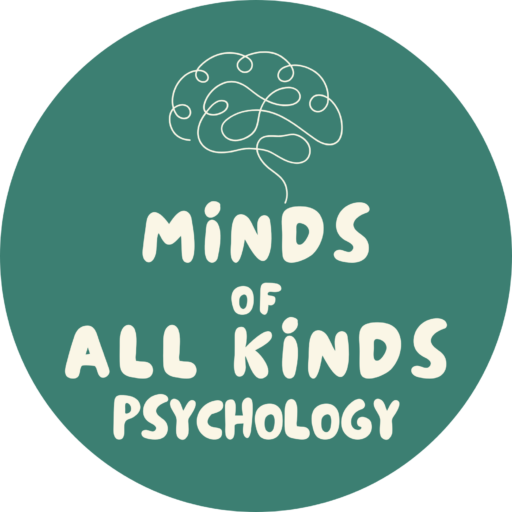At Minds of All Kinds Psychology in Heidelberg, we provide thorough cognitive assessments tailored to children, adolescents, and adults. Our assessments help identify strengths and challenges to guide personalised support and interventions.
Who Conducts the Assessment? (Provisional vs Registered Psychologists)
Our fees are broken down into type of psychologist who does the assessment:
Provisional psychologists are completing their final year of supervised practice before becoming a registered psychologist. All reports are supervised and signed off by the Director of the practice, and reports are valid for use for funding and other purposes (e.g., NDIS applications).
Registered psychologists have completed all of their formal training and work primarily independently.
What Is a Cognitive Assessment?
A cognitive assessment is a multi-step process that includes a combination of interviews, testing, and feedback. Each component helps us gather information about development and skills, leading to a comprehensive and personalised report.
What’s Involved in the Assessment Process?
The assessment includes:
Developmental Interview
A developmental interview is undertaken to discuss you or your child’s early development, strengths, interests, and any current concerns. This conversation helps us understand you or your child’s history.
Cognitive Assessment
A cognitive assessment is used to help determine cognitive strengths and challenges which helps us understand how your brain works and how you learn best. This helps us personalise recommendations to support you or your child’s needs best. A cognitive assessment involves tasks that look at:
- Verbal Comprehension – using and understanding language
- Visual Spatial – understanding and processing visual information
- Fluid Reasoning – problem solving skills
- Working Memory – remembering and manipulating things in our short term memory
- Processing Speed – quickly completing simple tasks
A cognitive assessment is chosen based on age. At Minds of All Kinds Psychology, we use the following cognitive assessments:
- Wechsler Preschool and Primary Scale of Intelligence, Fourth Edition (WPPSI-IV)
- Wechsler Intelligence Scale for Children, Fifth Edition (WISC-V)
- Wechsler Adult Intelligence Scale, Fourth Edition (WAIS-IV)
Social-Emotional Questionnaires
You or your parents/carers, teachers, and sometimes other members of your social circle (such as siblings or partners) may be asked to complete questionnaires related to social and emotional behaviour. These questionnaires help us understand social communication preferences, emotional regulation, and behavioural patterns.
Report
After completing all assessments, we compile the findings into a detailed, written report that outlines strengths, challenges, and diagnosis (if applicable). This report provides specific recommendations for interventions and strategies to support you or your child’s development.
Feedback
A feedback session will be scheduled to review the results with you, answer any questions, and discuss recommendations. This is an important step in understanding the findings and planning the next steps.
Two weeks after the feedback session, we schedule a ‘check in’ call. This gives you a chance to ask any additional questions you may have after reading the report and processing the whole assessment.
How to Prepare for a Cognitive Assessment
You do not need to prepare for an assessment. However, some find it helpful to reflect on the following areas before an assessment:
- Review Early Development:
- It can be helpful to revisit your child’s baby book or early developmental records. This will allow you to reflect on their early milestones and any concerns that may have arisen during their development. If you have videos from when your child was younger, watching them can provide valuable insights into their early development and behaviour.
- For adults, you may mind it helpful to ask your parents or siblings about your childhood and experiences at school.
- Think About Preferences Now:
- Consider your child’s current presentation, such as preferences around play or social interactions, sensory needs, and any challenges. It is also important to reflect on their strengths, such as their interests, skills, and strengths. These insights will help inform the assessment process.
- For adults, think about how you learn and your interests, skills, and strengths.
Referral & Funding Options for Cognitive Assessments
You do not need a referral to complete a cognitive assessment, however it may be beneficial to include you or your child’s paediatrician, GP, or other care team members in the process.
Medicare
Unfortunately, Medicare do not cover cognitive assessments unless part of an autism assessment under the Medicare Complex Neurodevelopmental Disorders referral. For more information on this referral, visit our Autism Assessments page.
Private Health Insurance
Some health insurance policies may cover assessments; please contact your insurer directly to check your coverage.
NDIS
NDIS does not fund diagnostic assessments. If you have an NDIS plan, it is recommended you contact your Local Area Coordinator (LAC; listed in your NDIS plan) to enquire directly about if an assessment can be covered in your circumstances.
Fees for Cognitive Assessments
Provisional Psychologist
$1310Registered Psychologist
$1790How to Book Your Cognitive Assessment
At Minds of All Kinds Psychology in Heidelberg, our goal is to provide a comprehensive, supportive, and individualised assessment experience. We aim to empower families with the knowledge and tools they need to support their child’s growth and development.
If you have any questions or would like to book an autism assessment, please don’t hesitate to contact us.
